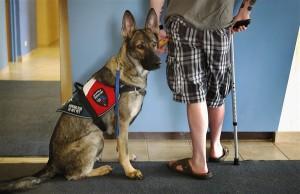 When retired U.S. Army Staff Sergeant Justin Madore has nightmares, his dog Cody is there to wake him up.
When retired U.S. Army Staff Sergeant Justin Madore has nightmares, his dog Cody is there to wake him up.
“Cody gets up in my bed and starts pounding on me – it’ll knock my wife right out of bed,” said Madore, 37, who suffers from post-traumatic stress disorder. “The dogs become a part of us – they know when there’s something off.”
Cody, a 3-year-old Labradoodle, a Labrador retriever and poodle mix, has had special training. He and Madore met up at K9s for Warriors in Ponte Vedra Beach, Florida, where the non-profit center has trained dogs for two years to help veterans who suffer from PTSD and traumatic brain injuries, said executive director Shari Duval.
A U.S. Veterans Affairs report reveals that of about 830,000 veterans treated at VA medical centers over the last decade, 29 percent had a diagnosis of PTSD, and 22 percent were suffering from depression.
K9s for Warriors offers veterans a three-week in-house program to meet and learn how to work with their dogs.
The dogs are not as highly trained as seeing-eye dogs for the blind, said Duval, but they do have special skills.
They are able to provide assistance – like fetching objects for soldiers with physical disabilities. They are also trained to create personal space for veterans whose condition may make them nervous in a crowd. A dog is taught to “cover and block” – to stand between a vet and an approaching person, or behind a vet when he or she is standing in line, Duval explained.
“It’s clearing the area – it gives them that space,” said Duval, who is married to U.S. professional golfer Bobby Duval.
She was inspired by her son, Brett Simon, an independent contractor for the U.S. Army, who worked as a bomb dog handler in Iraq.
When he came back home in 2009, Duval recalled, he had PTSD and “the only time he came to life was around dogs. So I started doing research into this.”
Simon now directs canine operations for the organization.
The K9s for Warriors facility, which can house five soldiers at a time, has graduated 83 veterans and dogs, mostly dogs from shelters, Duval said.
“The dog is literally a prescription on four legs,” she said. The training cost of $10,000 for each veteran-dog team is paid for by private donations.
Madore, who served in Iraq and Afghanistan and now lives in Charlotte, North Carolina, said PTSD had kept him housebound for five years.
“Now I can go to the store on my own. I can go and pick up my kids from school and take my daughter to gymnastics,” Madore said. “It’s all due to Cody.”
A new facility has been donated to K9s for Warriors and will allow them to train 16 warriors a month by the end of 2014, Duval said.
The organization caught the attention of television personality and author Wendy Diamond, who focuses on animal-related causes and is conducting a national tour for K9s for Warriors this summer and fall.
The “Bark Business Breakfast” tour had an event in Chicago on Saturday, and so far has raised nearly $100,000. Among the donors are retired Los Angeles Lakers and Chicago Bulls coach Phil Jackson, Lakers owner Jeannie Buss and New Orleans Saints coach Sean Payton.
Other groups that match up shelter animals with veterans include Pets for Vets, which has chapters around the country.
Duval said one veteran coming to K9s for Warriors in December is Sergeant Alonzo Lunsford, who was shot five times and lost sight in his right eye during the 2009 shooting rampage at Fort Hood. The shooter, Major Nidal Hasan, was sentenced to death late last month for killing 13 people and wounding 32.
Noting that the 6-foot-9 Lunsford is very tall, Duval said: “We have a special dog for him – a bull mastiff.”
~ Courtesy of NBC news
Tags: dog hero, K9s for Warriors, Pets for Vets, PTSD, service dog
